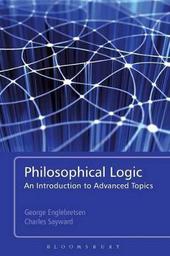
|
Philosophical Logic: An Introduction to Advanced Topics
Paperback / softback
Main Details
| Title |
Philosophical Logic: An Introduction to Advanced Topics
|
| Authors and Contributors |
By (author) Professor George Englebretsen
|
|
By (author) Professor Charles Sayward
|
| Physical Properties |
| Format:Paperback / softback | | Pages:208 | | Dimensions(mm): Height 234,Width 156 |
|
| Category/Genre | Philosophy - logic |
|---|
| ISBN/Barcode |
9781441119117
|
| Classifications | Dewey:160 |
|---|
| Audience | | Professional & Vocational | |
|---|
|
Publishing Details |
| Publisher |
Continuum Publishing Corporation
|
| Imprint |
Continuum Publishing Corporation
|
| Publication Date |
24 March 2011 |
| Publication Country |
United States
|
Description
Taking students beyond classical mathematical logic, Philosophical Logic is a wide-ranging introduction to more advanced topics in the study of philosophical logic. Starting by contrasting familiar classical logic with constructivist or intuitionist logic, the book goes on to offer concise but easy-to-read introductions to such subjects as quantificational and syllogistic logic, modal logic and set theory. Chapters include: * Sentential Logic * Quantificational Logic * Sentential Modal Logic * Quantification and Modality * Set Theory * Incompleteness * An Introduction to Term Logic * Modal Term Logic In addition, the book includes a list of symbols and a glossary of terms for ease of reference and exercises throughout help students master the topics covered in the book. Philosophical Logic is an essential, student-friendly guide for anyone studying these difficult topics as part of their Logic course.
Author Biography
George Englebretsen is Professor Emeritus at Bishop's University, Canada. He is the author of a large number of works dealing with topics in the philosophy of logic and language, metaphysics and the history of logic. Charles Sayward is Professor of Philosophy at the University of Nebraska-Lincoln, USA. He is a much-published author of works in the philosophy of logic and the philosophy of mathematics, most recently Dialogues Concerning Natural Numbers.
ReviewsEnglebretsen and Sayward's book fills a gap in the current array of logic textbooks available. It starts from the beginning, thus allowing students to gain the first rudiments of symbolization; yet, it covers areas usually neglected in introductory logic textbook such as set theory and modal logic. Finally, it presents a constructivist approach in contrast to the point of view of classical logic usually tacitly assumed in logic textbooks and a substitutional rather than an objectual interpretation of quantification. This is truly a logic textbook for philosophers. -- Pieranna Garavaso, University of Minnesota, Morris, USA
|